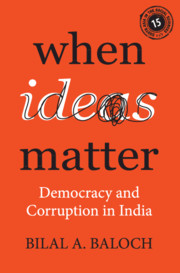Book contents
- Frontmatter
- Dedication
- Contents
- List of Table
- Preface
- Acknowledgments
- List of Abbreviations
- 1 Introduction
- 2 A Constructivist Approach to Political Behavior in India
- 3 The Emergency and the Jayaprakash Narayan Movement
- 4 India under Gandhi: Populism and Partisans
- 5 Checks and Balances and the India Against Corruption Movement
- 6 United Progressive Alliance: Technocrats and Transformations
- 7 The Politics of Ideas in India and Developing Democracies
- Appendices
- Bibliography
- Index
3 - The Emergency and the Jayaprakash Narayan Movement
Published online by Cambridge University Press: 30 June 2021
- Frontmatter
- Dedication
- Contents
- List of Table
- Preface
- Acknowledgments
- List of Abbreviations
- 1 Introduction
- 2 A Constructivist Approach to Political Behavior in India
- 3 The Emergency and the Jayaprakash Narayan Movement
- 4 India under Gandhi: Populism and Partisans
- 5 Checks and Balances and the India Against Corruption Movement
- 6 United Progressive Alliance: Technocrats and Transformations
- 7 The Politics of Ideas in India and Developing Democracies
- Appendices
- Bibliography
- Index
Summary
Jayaprakash [Narayan] has never taken me seriously. He does not understand that for action to be potent, time is of the essence…. One has to be really ruthless if the need arises. I am ruthless for what I think right.
—Prime Minister Indira Gandhi to Pupul Jayakar, 1971Indira is India, India is Indira.
—D. K. Barooah, Congress Party president, CPP meeting, June 18, 1975Congress Party and Indira Gandhi
Indira Gandhi declared an internal Emergency throughout India on the night of June 25, 1975, thereby formally suppressing the anti-corruption JPM. As one historian of the period has remarked: “While the functioning of the Emergency may be seen in isolation, any analysis of its causes, its historical significance, as well as its consequences, has to be in the context of the JP movement.” The Emergency continued for 21 months, during which India witnessed the abuse of state powers to undercut institutions and the suppression of civil liberties and freedom of the press. This period in India's history (1975–77) has been insufficiently considered by scholars and historians. The primary reason is the dearth of primary evidence and the simplistically dichotomous, or perhaps partisan, historiography of first-hand accounts. This chapter will consider the way in which state elites—chief among them Prime Minister Indira Gandhi— harnessed state power to reshape society, a process that began by centralizing executive power to monopolize decision-making. Conditions underscoring this political and institutional setting provided the structural pathways that allowed the government to proclaim an Emergency and crush the JPM.
Prime Minister Indira Gandhi, who rose to office on a populist platform, enjoyed almost absolute political power in India—in large part due to the political strength of the Congress Party. During Gandhi's tenure, several highly publicized corruption scandals damaged government credibility, and the public outcry over these scandals came to a crescendo immediately before the government proclamation of a national internal Emergency. The centralizing state power in the hands of the populist prime minister, coupled with the force of a majority Congress, provided fertile conditions for Gandhi to supersede state institutions and declare a national Emergency. This chapter considers the Indian government's response to the JPM, and traces both the events that led to the Emergency and the steps taken by Gandhi and her close advisors to suppress the movement.
- Type
- Chapter
- Information
- When Ideas MatterDemocracy and Corruption in India, pp. 53 - 88Publisher: Cambridge University PressPrint publication year: 2021



